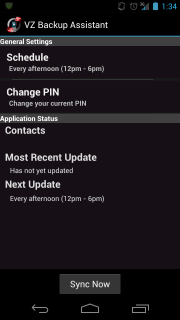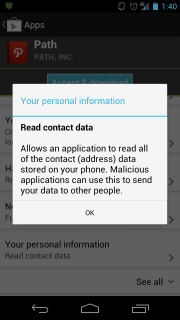Not all Android apps are created equal, and most are far from perfect.
And I'm not just talking about all of the unpopular, unmonitored apps that flood Google Play and often end up being ousted because they're spammy or malicious. Even popular apps from respected companies are often guilty of draining your battery, shilling for (paid) updates, and spamming your notification bar with ads.
Here are more than a dozen popular apps that offend in various ways.
Noisy Notifier: Instagram for Android
 Instagram made its Android debut just a couple of weeks ago, but the app isn't perfect.
One major issue is that the default notification setting is to spam you
with updates whenever one of your contacts joins Instagram. Not when
they follow you, just when they join. You can disable this by going to: Instagram, Settings, Edit Profile, Manage Settings, Push Notifications, Contact Notifications. Yeah, they really make it easy.
Instagram made its Android debut just a couple of weeks ago, but the app isn't perfect.
One major issue is that the default notification setting is to spam you
with updates whenever one of your contacts joins Instagram. Not when
they follow you, just when they join. You can disable this by going to: Instagram, Settings, Edit Profile, Manage Settings, Push Notifications, Contact Notifications. Yeah, they really make it easy.Super Spammer: Gun Bros.
 Glu Mobile's free Gun Bros. is packed with fast-paced action and spammy ad notifications. The game uses alerts (similar to, but not, those from the Airpush ad network)
to constantly pester you with promotional material--from Gun Bros., at
least--in your notification bar. You can turn off the Gun Bros. ads in
the Settings menu.
Glu Mobile's free Gun Bros. is packed with fast-paced action and spammy ad notifications. The game uses alerts (similar to, but not, those from the Airpush ad network)
to constantly pester you with promotional material--from Gun Bros., at
least--in your notification bar. You can turn off the Gun Bros. ads in
the Settings menu.Data Hog: Netflix
 Apps that use tons of data
get a bad rap, perhaps unfairly--after all, you can't make a streaming
video app that doesn't use tons of data. Still, Netflix is the major
offender in this category. In fact, Netflix is such a data hog that even landline Internet providers
are trying to put a cap on it. Netflix data consumption varies, because
Netflix constantly adjusts video quality to keep up with your
connection speed. But in our tests, streaming Netflix for just 10
minutes over Verizon's LTE network used between 100MB and 200MB of data.
Apps that use tons of data
get a bad rap, perhaps unfairly--after all, you can't make a streaming
video app that doesn't use tons of data. Still, Netflix is the major
offender in this category. In fact, Netflix is such a data hog that even landline Internet providers
are trying to put a cap on it. Netflix data consumption varies, because
Netflix constantly adjusts video quality to keep up with your
connection speed. But in our tests, streaming Netflix for just 10
minutes over Verizon's LTE network used between 100MB and 200MB of data.Battery Drain: Angry Birds
 Rovio's
Angry Birds is uber-popular, especially on Android, where the app is
free and ad-supported. But those "free" ads can cost you--in battery life, according to a new study by Purdue University. The study, which was performed in collaboration with Microsoft, claims that third-party advertising in free apps
can be responsible for as much as 75 percent of an app's battery
consumption. The researchers looked at Angry Birds and found that the
core gaming component consumed only about 18 percent of the app's
energy, while 45 percent of the app's energy went to third-party ads and
analytics.
Rovio's
Angry Birds is uber-popular, especially on Android, where the app is
free and ad-supported. But those "free" ads can cost you--in battery life, according to a new study by Purdue University. The study, which was performed in collaboration with Microsoft, claims that third-party advertising in free apps
can be responsible for as much as 75 percent of an app's battery
consumption. The researchers looked at Angry Birds and found that the
core gaming component consumed only about 18 percent of the app's
energy, while 45 percent of the app's energy went to third-party ads and
analytics.Bloatware: Verizon's Apps
 VZ Backup Assistant, a preloaded Verizon app.Annoying
apps are one thing, but at least you can remove them--most of the time.
But if they come preloaded on your device, your carrier likely doesn't
want you to do any such thing. Verizon phones, for example, come
preloaded with My Verizon Mobile and VZ Backup Assistant, and there's
nothing you can do about it. Unless you have Android 4.0 (Ice Cream
Sandwich), that is. In ICS, you can disable and hide any system app (but you still can't remove it).
VZ Backup Assistant, a preloaded Verizon app.Annoying
apps are one thing, but at least you can remove them--most of the time.
But if they come preloaded on your device, your carrier likely doesn't
want you to do any such thing. Verizon phones, for example, come
preloaded with My Verizon Mobile and VZ Backup Assistant, and there's
nothing you can do about it. Unless you have Android 4.0 (Ice Cream
Sandwich), that is. In ICS, you can disable and hide any system app (but you still can't remove it).Misleading: Triple Town
 I
like free apps. I also like paid apps--if I think they're worth my
money. I don't even mind freemium apps. But I do take issue with "freemium" apps that basically require an in-app purchase. Spry Fox's popular puzzle game Triple Town
is one such app. Don't get me wrong--TripleTown is fun, polished, and
super addictive. But you get only a limited number of free turns, which
replenish ve-e-e-ery slowly after you run out. You can purchase
unlimited turns for $4, which isn't a bad price…unless you were hoping
to play the game for, well, free. I get it, indie game developers have
to make money, but I would rather that they just charge for the game up
front.
I
like free apps. I also like paid apps--if I think they're worth my
money. I don't even mind freemium apps. But I do take issue with "freemium" apps that basically require an in-app purchase. Spry Fox's popular puzzle game Triple Town
is one such app. Don't get me wrong--TripleTown is fun, polished, and
super addictive. But you get only a limited number of free turns, which
replenish ve-e-e-ery slowly after you run out. You can purchase
unlimited turns for $4, which isn't a bad price…unless you were hoping
to play the game for, well, free. I get it, indie game developers have
to make money, but I would rather that they just charge for the game up
front.Constant Crasher: Facebook for Android
 Social
networking is all about being constantly connected to your friends,
both real and virtual, right? But it's hard to stay connected on the
world's biggest social network when Facebook for Android constantly crashes. Yep, just about every time I open Facebook for Android
and use it for a few minutes, it will inevitably freeze and pop up a
little message that says the app has stopped working. And I'm not the
only one--check out the less-than-stellar reviews on the app's Google Play page.
Social
networking is all about being constantly connected to your friends,
both real and virtual, right? But it's hard to stay connected on the
world's biggest social network when Facebook for Android constantly crashes. Yep, just about every time I open Facebook for Android
and use it for a few minutes, it will inevitably freeze and pop up a
little message that says the app has stopped working. And I'm not the
only one--check out the less-than-stellar reviews on the app's Google Play page.Super Spammer: MySettings
 JQ Soft's MySettings
is a free widget app that lets you place toggles on your home screen
for various system settings, including Auto Rotate, Airplane Mode,
Network Mode, Flashlight, Bluetooth, and Unlock Pattern. Unfortunately,
this app is ad-supported--and the ads are delivered via Airpush,
to your notification bar. Not only that, but they're especially spammy
ads: Users can look forward to a barrage of messages such as "You won an
iPad2!"
JQ Soft's MySettings
is a free widget app that lets you place toggles on your home screen
for various system settings, including Auto Rotate, Airplane Mode,
Network Mode, Flashlight, Bluetooth, and Unlock Pattern. Unfortunately,
this app is ad-supported--and the ads are delivered via Airpush,
to your notification bar. Not only that, but they're especially spammy
ads: Users can look forward to a barrage of messages such as "You won an
iPad2!"Data Hog: Google+ Hangouts
The Hangouts feature of Google+ may be a cool idea--video chatting with multiple people at once--but it can cost you some serious data. In our tests,
Google+ Hangouts chats ate up 30MB per 2-minute session, which is about
six times more data than Skype uses. So if you're a video-chat junkie,
it's probably better to chat with just one person at a time.
Hangouts feature of Google+ may be a cool idea--video chatting with multiple people at once--but it can cost you some serious data. In our tests,
Google+ Hangouts chats ate up 30MB per 2-minute session, which is about
six times more data than Skype uses. So if you're a video-chat junkie,
it's probably better to chat with just one person at a time.Battery Drain: Google Maps
If you use Google Maps only occasionally to glance at directions or look up addresses, you won't notice a major battery life hit. But if you use it obsessively, you definitely will. Google Maps drains battery life through many channels: Back-up processes, location services, and turning on satellite GPS (instead of using wireless network GPS).Overrated: Advanced Task Killer
 If you've recently gotten a new Android phone, it's very likely that your friends had some advice for you: Download Advanced Task Killer and your battery life will thank you! Well, as it turns out, Advanced Task Killer is totally overrated--at
best, it offers up a measly improvement of around 4 percent battery
life (which gives you about 15 extra minutes); but at worst, it actually
lowers your battery life, albeit not by much (around 2 minutes).
Generally, all this app really does is sit on your home screen and make
money for its developers.
If you've recently gotten a new Android phone, it's very likely that your friends had some advice for you: Download Advanced Task Killer and your battery life will thank you! Well, as it turns out, Advanced Task Killer is totally overrated--at
best, it offers up a measly improvement of around 4 percent battery
life (which gives you about 15 extra minutes); but at worst, it actually
lowers your battery life, albeit not by much (around 2 minutes).
Generally, all this app really does is sit on your home screen and make
money for its developers.Privacy Invaders: Too Many to Name
 Some apps, like Path, want your contact information.The Android platform is notorious for having, ahem, lax security
procedures. In other words, the OS is ripe for getting hit with
malware. One of the major issues is that too many apps are unnecessarily
bold when they ask for permissions.
Some apps, like Path, want your contact information.The Android platform is notorious for having, ahem, lax security
procedures. In other words, the OS is ripe for getting hit with
malware. One of the major issues is that too many apps are unnecessarily
bold when they ask for permissions.For example, do apps such as Path, Instagram, Foodspotting, and Yelp need constant access to your contact information? Probably not. Does the game Tiki Cart 3D need access to your location? Does Angry Birds Space need to be able to access the phone features of your device? Not really. But you agree to let all of these apps have those permissions when you download them.
If you want to check what permissions apps want on your Android device, download Avast Mobile Security, a free app that lets you view apps by permission.
Visit Our Website for more details


True story.
ReplyDelete